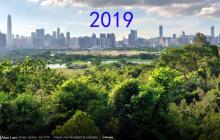25 Aug 1942, "Exchange Ship" by Max Hill
Primary tabs
Eighteen thousand miles of travel, three continents and four oceans were behind us early the morning of August 25, when we arrived in the Lower Bay off New York. The fourth continent, North America, was so close we would be able to see the shore lights in a short time. We had crossed the equator twice. It was summer when we left Yokohama. Then we drooped in the heat of the tropics. After that we enjoyed the mild weather of Lourenco Marques, followed by cold around the Cape of Good Hope. It was spring in Rio, and the equator off South America was just as hot as it had been at Singapore. Now it was summer again. The only season we missed somewhere along the route was autumn.
Ambassador Grew said that among the traditional rites observed by his family was one which he thought would be helpful to the adults before him, since they had been long absent from the United States, and to the children who in a few days would set foot on American soil for the first time.
Each time he sailed into New York harbor after a term of duty in a foreign land and first saw the Statue of Liberty, he said, he repeated:
“Breathes there the man, with souls so dead,
Who never to himself hath said,
This is my own, my native land!
Whose heart hath ne’er within him burn’d
As home his footsteps he hath turn’d
From wandering on a foreign strand?”
I got out my typewriter and set it up on a near-by table. I went to work. The story I wrote then, on the spot, for the Associated Press follows:
“New York harbor, Aug. 25 (AP)—Thirteen Coast Guardsmen boarded the M.S.Gripsholm at 4a.m. Tuesday, and were welcomed by a small but happy group of repatriates who had remained up throughout the night for their first glimpse of the lights of New York harbor.
More than 1500 men, women, and children were aboard the Swedish exchange liner, all from Japan or Japanese-occupied territory in the Far East.
Stout curly-headed Emil Gassie, who was on the gunboat Panay, which was bombed off Nanking some years ago by the Japanese, was among those who warmly returned the handclasps of the coastguardsmen who boarded the Gripsholm.
Mrs. Herman Scholtz of Louisville, Kentucky, and Bangkok, Thailand, awakened by the noise, hurriedly slipped on the evening gown she had taken off a few hours earlier and started toward the promenade deck. A coastguardsman watched the stairway. She paused, and dabbed at the tears in her eyes when she saw the eagle on his cap.
“Are you---are you an American?” she asked.
“Yes, ma’am,” he replied. “We came on to take care of you from here on in.”
Off the port side of the Gripsholm, which started moving slowly toward the Narrows after the coastguardsmen boarded her, the red and white lights of a pat... ((patrol? 6 characters)) blinked a bright message. It was not yet dawn. The sky was still black.
Soon the deck was thronged with early risers, one of whom approached a guard with the remark:
“Boy! Am I glad to see you!”
The coast guardsman grinned.
“I don’t doubt it” he said.
Children who had never seen the United States joined the impatient group pacing the deck. Then, out of the night, the dim yellow lights of Staten Island provided a welcome sight for the tired voyagers—they were safe at last in the greatest harbor of their homeland.
Nuns in severe habits mingled with women still in nightgowns and pajamas covered only by coats, and others wrapped in blankets for warmth against the chill of the harbor night, even though it was August. Always the rail was lined with eager men and women and children talking about the lights they saw—the lights of America, the land to which they had been returning since June 17.
A Presbyterian pastor, one of the most devout on board came up to my table and watched me write. Finally he said: “Pardon me, but don’t forget to say how damn good those boys in uniform looked to us.” He was one of the men who had been tortured by Japanese gendarmes, beaten and bullied in a desperate effort to make him confess to a crime of which he was not guilty—espionage.
Without delay, the Gripsholm kept to her slow course toward Quarantine, with a low orange moon almost down to the horizon on the port side. Some of the women laughed: others cried. Men did impromptu little jigs. They were carefree and really happy for the first time in many long months. Fathers lifted their sons and daughters up so they could peer over the rail and see—dimly, to be sure, in the first light of the dawn—the America they had been told about but had never visited.
A score or more of passengers didn’t depend upon the stewards for food. They had taken sandwiches and hot coffee in thermos bottles to their cabins with them the night before.
Four motorboats which bounced along, throwing up a white spray, joined us for the rest of the way up the harbor, two on each side.”
It was long after sunrise before we saw the Statue of Liberty, big and bold and impressive. We were home and we had a job to do.
Breaths there the man with soul so dead—
THE END

